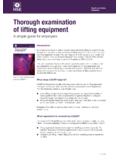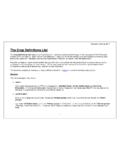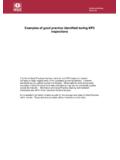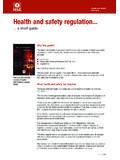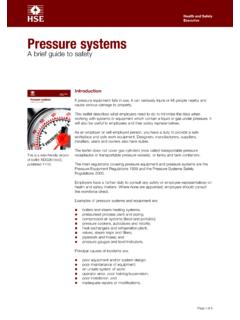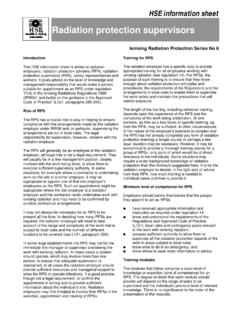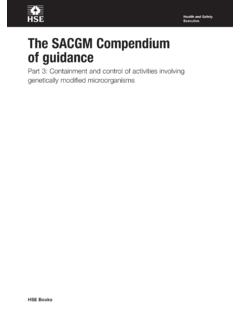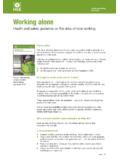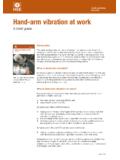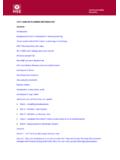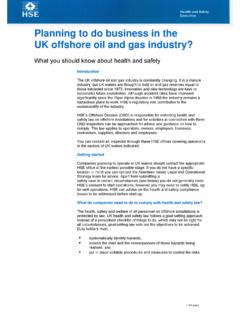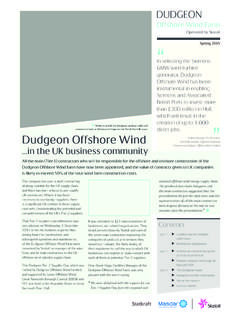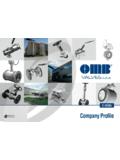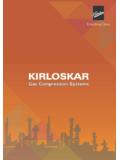Transcription of GUIDANCE NOTES FOR PREPARING OIL …
1 GUIDANCE NOTES FOR. PREPARING OIL pollution . emergency PLANS. For offshore Oil and Gas Installations and Relevant Oil Handling Facilities October 2017. Introduction Crown copyright October 2017. You may re-use this information (not including logos) free of charge in any format or medium, under the terms of the Open Government Licence. To view this licence, visit or write to the Information Policy Team, The National Archives, Kew, London TW9 4DU, or email: Any enquiries regarding this publication should be sent to us at offshore Inspectorate, Department for Business, Energy and Industrial Strategy, AB1 Building, Crimon Place, Aberdeen, AB10 1BJ. Email: Telephone: 01224 254138. This document is available at 2. Introduction Revision Date Comment 0 January First Issue 2015. 1 May 2015 Amended to reflect industry comments 2 August Amended version issued following 2015 implementation of amendments to the OPRC.
2 Regulations. 3 December Amended to address queries arising throughout 2016 2015 and 2016. 4 October Amended to reflect introduction of the 2017 Competent Authority Portal OPEP. submission/update process 3. Table of Contents 1. Introduction _____ 5. 2. Legislative Background _____ 6. 3. When is an OPEP Required? _____ 9. 4. Administrative Process _____ 10. Appendix A Structure and Content of OPEPs _____ 17. Appendix B Modelling GUIDANCE _____ 44. Appendix C Training and Exercises _____ 50. Appendix D Oil Spill Reporting Arrangements _____ 57. Appendix E Oil Spill Sampling Requirements _____ 59. Appendix F Dispersants Use and Approval _____ 60. Appendix G Shoreline Response Planning _____ 66. Appendix H OCU Requirements _____ 68. Appendix I Aerial Surveillance Requirements _____ 70. Appendix J Definitions and Abbreviations _____ 72.
3 Introduction 1. Introduction This document provides GUIDANCE to Installation Operators, Well Operators and Owners of Non Production Installations for all offshore oil and gas operations conducted in the territorial sea adjacent to the UK or any area designated under section 1(7) of the Continental Shelf Act 1964. For the purposes of this GUIDANCE and as per The Merchant Shipping (Oil pollution Preparedness, Response and Co-operation Convention) Regulations 1998 (as amended). (OPRC Regulations), Installation Operators, Well Operators and Owners of Non Production Installations are referred to as Responsible Persons'. Operators of pipelines and relevant Oil Handling Facilities are defined as Operators of Oil Handling Facilities'. An OPEP is a legally required emergency response document which will facilitate the implementation of a robust and effective response to an oil pollution incident and minimise the impact on the marine environment.
4 Persons who submit an OPEP are reminded that OPEPs may be made publicly available. This GUIDANCE supersedes all previous OPEP GUIDANCE issued by the Department for Business, Energy and Industrial Strategy (the Department). 5. Legislative Background 2. Legislative Background The OPRC Convention The International Convention on Oil pollution Preparedness, Response and Cooperation (OPRC Convention) as adopted by the International Maritime Organisation (IMO) in 1990. entered into force in the United Kingdom (UK) on 16 December 1997 and was implemented for offshore oil and gas operations by the OPRC Regulations. The offshore Safety Directive On 28 June 2013 EU Directive 2013/30/EU on the safety of offshore oil and gas operations (The offshore Safety Directive - OSD) was published. The OSD requires that certain information regarding emergency response measures is included in the Internal emergency Response plan (IERP) which forms part of the Report on Major Hazards (Safety Case).
5 In the UK the IERP is delivered jointly by the OPEP and the emergency response plan required by PFEER. The requirements of the OSD must be fully transposed by 19 July 2016 for Non Production Installations (NPIs) and 19 July 2018 for Production Installations (including connected infrastructure). In order to implement those elements of the IERP relating to oil pollution response the OPRC Regulations were amended on 19 July 2015. The amended regulations introduce the concept of the Responsible Person and require that the Responsible Person or Operator of the Oil Handling Facility must have an OPEP in accordance with the requirements of the amended OPRC Regulations which must be prepared in accordance with this GUIDANCE . The Amended OPRC Regulations The OPRC Regulations apply to all UK waters and in any area designated under the Continental Shelf Act 1964 and state that every Responsible Person and operator of relevant Oil Handling Facilities must ensure that all offshore oil and gas operations for which they are responsible are subject to an OPEP approved by the Secretary of State for Business, Energy and Industrial Strategy.
6 The Department requires that OPEPs are in place for all operations in relation to offshore installations, connected infrastructure, Oil Handling Facilities or wells which present a risk of an oil pollution incident. For the purposes of the OPRC Regulations and this GUIDANCE all pipelines that are not connected infrastructure or any facility that would be an offshore Installation were it located in offshore Waters are considered to be Oil Handling Facilities. The 2015 amendments to the OPRC Regulations introduce different provisions for those offshore Installations (including connected infrastructure) located in offshore Waters as opposed to pipelines and Oil Handling Facilities. The content of OPEPs required for 6. Legislative Background pipelines and Oil Handling Facilities are unchanged by the 2015 amendments to the OPRC Regulations.
7 The offshore Installations ( emergency pollution Control). Regulations 2002. The offshore Installations ( emergency pollution Control) Regulations 2002 (the EPC. Regulations) are made under section 3 of the pollution Prevention and Control Act 1999 to provide the Secretary of State with intervention powers to prevent and reduce pollution and the risk of pollution following an accident involving an offshore installation. The Secretary of State's Representative (SOSREP) is authorised to exercise the intervention powers specified in the EPC Regulations. The powers conferred to the SOSREP are exercisable in the event that an accident involving an offshore oil and gas installation has occurred and, in the opinion of the Secretary of State, the accident will, or may cause significant pollution . To allow for the potential involvement of the SOSREP all OPEP's must reflect the requirements specified in relevant sections of this GUIDANCE and be consistent with the National Contingency plan (NCP).
8 OPEP Approval The Department is the regulatory authority, on behalf of the Secretary of State, for determining the suitability of OPEPs for all offshore oil and gas operations (including pipelines) in UK waters and in any area designated under the Continental Shelf Act. The OPEP review, assessment and approval process is conducted by the Department's offshore Environmental Inspectorate within the framework of the offshore Safety Directive Regulator (OSDR). OPEPs which relate to certain operations ( exploration well operations, appraisal well operations, deep water well operations, HPHT well operations) require sign off by the Department's senior management. Inspection, Regulatory Compliance and Enforcement During offshore Environmental Inspections OPEP arrangements may be inspected by the Department. Any inspection may include, but is not limited to: review of relevant offshore personnel's understanding of the OPEP.
9 Confirming that the training of relevant personnel meets requirements of the amended OPRC Regulations and this GUIDANCE ;. examination of the equipment available for use in the event of an oil release; and review of the exercises undertaken to test the arrangements in the OPEP. The Department will also request returns on an annual basis from Responsible Persons and Operators of Oil Handling Facilities to confirm the status of training certification and the exercises that were undertaken to test the OPEP. 7. Legislative Background Offences Regulation 7 of the amended OPRC Regulations details the offences in relation to OPEPs. Regulation 7(1). Any Operator of an Oil Handling Facility or any Responsible Person who, without reasonable cause: a) fails to submit or re-submit an OPEP in accordance with regulation 4(3), (4) or (5);. b) does not maintain an OPEP as approved (with alterations directed by the Secretary of State, as the case may be, if so directed) under regulation 4(5) to (7); or c) fails to implement its OPEP in contravention of regulation 4(8), shall be guilty of an offence punishable on summary conviction by a fine not exceeding the statutory maximum or on conviction on indictment by a fine.
10 Regulation 7(2). Any Person required to make a report under regulation 5 or 6, as the case may be who, without reasonable cause, fails to comply with that requirement in all respects shall be guilty of an offence punishable on summary conviction by a fine not exceeding the statutory maximum or on conviction on indictment by a fine. Regulation 7(3). Any Responsible Person who without reasonable cause: a) fails to comply with a duty under regulation 4(9); or b) breaches the obligation in regulation 4(10), is guilty of an offence punishable on summary conviction by a fine not exceeding 5,000, or on conviction on indictment by a fine. Regulation 7(4). Any Operator of an Oil Handling Facility who, without reasonable cause, breaches the obligation in regulation 4 (11) is guilty of an offence punishable on summary conviction by a fine not exceeding 5,000, or on conviction on indictment by a fine.
